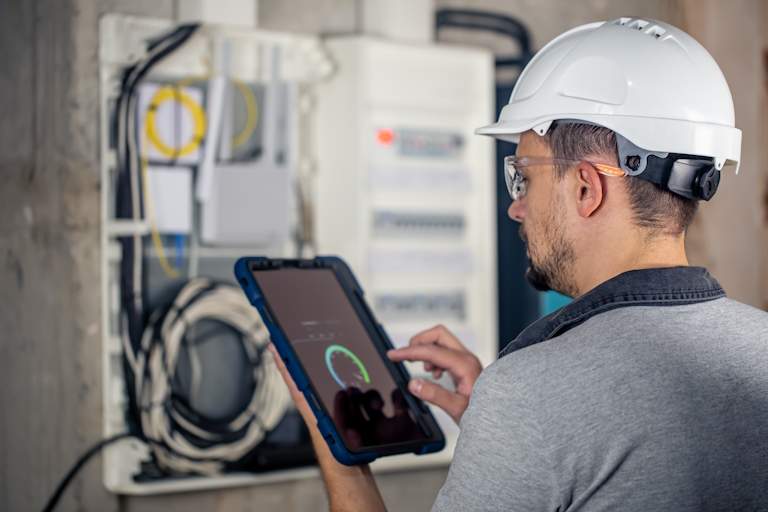Efficient and effective job dispatch systems are crucial for maintaining brand standards and achieving operational excellence. Engineering tasks, require exact coordination and skilled execution to ensure that the right person is doing the right job at the right time, enhancing the guest experience.
This article explores the advantages of advanced job dispatch systems, focusing on skill-based allocation, load balancing, location-based dispatching, and ensuring technicians are equipped with the right tools. Additionally, we will discuss the significance of escalation procedures, job monitoring, and post-job analysis for improving response times and rostering efficiency.

Skill-Based Job Allocation
Assigning the right job to the right technician is fundamental in ensuring high-quality and timely completion of jobs. Hotels often have a diverse range of engineering tasks, from HVAC maintenance and electrical repairs to plumbing and general facilities management. Each task requires a specific skill set, and misallocating these jobs can lead to inefficiencies, increased downtime, and potentially higher costs. Effective job dispatch systems incorporate the skills and certifications of each technician, ensuring that tasks are assigned to those best qualified to complete them. This improves the quality of work and boosts the confidence of both staff and guests in the hotel’s operational capabilities.
Load Balancing for Optimal Efficiency
Engineering tasks can quickly pile up, leading to uneven workloads among technicians. Load balancing is a critical feature of an advanced system, distributing tasks evenly based on current workloads, skill levels, and availability. By ensuring that no single technician is overwhelmed, hotels can maintain a steady workflow, improving overall job satisfaction among staff. Load balancing also helps in prioritizing urgent tasks without neglecting routine maintenance, thus maintaining operational excellence and enhancing guest satisfaction.
Location-Based Job Dispatching
For hotels with multiple buildings or large sites, the geographical distribution of tasks is a significant consideration. An advanced job dispatch system takes into account the location of each job and the current position of technicians, minimizing travel time and maximizing productivity. For example, if a technician is already working in one building, assigning nearby tasks can reduce downtime between jobs. This location-based approach ensures quicker response times to guest requests and emergencies, directly contributing to an improved guest experience.
Equipping Technicians with the Right Tools
A key component of job efficiency is ensuring that technicians have the right tools and parts for the tasks they are assigned. Advanced dispatch systems can integrate inventory management features, alerting technicians and managers when specific tools or parts are required. By pre-emptively preparing for each job, hotels can reduce delays caused by missing or inadequate equipment, ensuring that tasks are completed efficiently and effectively on the first visit, thereby minimizing disruption and enhancing the guest experience.
Escalation Procedures and Job Monitoring
Despite the best planning, some tasks may encounter unforeseen complications. Having clear escalation processes ensures that brand standards are maintained and complex issues are quickly brought to the attention of managers. Real-time job monitoring allows managers to track progress, intervene when necessary, and reallocate resources to prevent bottlenecks. If a job cannot be completed, updates are communicated promptly to relevant stakeholders, including hotel management and affected guests, to manage expectations and maintain trust.
Analyzing Jobs for Improved Rostering and Response Times
Post-job analysis is essential for continuous improvement. By reviewing completed tasks, including the time taken, resources used, and any issues encountered, hotels can identify patterns and areas for improvement. This helps in refining rostering practices, ensuring that the right number of technicians with the appropriate skills are available at peak times. Additionally, analyzing response times and job completion rates provides insights into operational efficiency, guiding strategic decisions to further enhance the guest experience.
Conclusion
Advanced job dispatch systems are vital for achieving operational excellence in hotel engineering services. By ensuring skill-based allocation, load balancing, location-based dispatching, and equipping technicians with the right tools, hotels can significantly improve their maintenance operations. Incorporating robust escalation procedures, real-time job monitoring, and thorough post-job analysis further enhances operational efficiency, leading to faster response times and more effective rostering. Ultimately, these improvements contribute to a superior guest experience and a well-maintained, smoothly running hotel environment.
About Q2
For over 25 years Q2 have helped hotels implement effective hotel operations solutions leading to improved guest satisfaction including engineering, planned maintenance, asset management, inventory management, and guest services. Sidekick and ESCAP cloud software platforms ensure that these plans are well-designed and executed empowering hotels to deliver memorable experiences to their guests.

